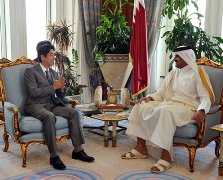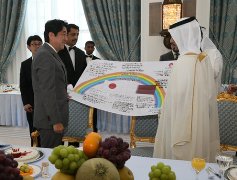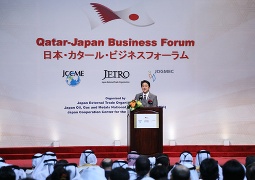Countries & Regions
Prime Minister Shinzo Abe’s Visit to Qatar (August 28)




On Wednesday, August 28, Mr. Shinzo Abe, the Prime Minister, visited Qatar. Major events, overview, and results of his visit are as follows:
1. Major Events
(1) Opening remarks delivered at the Japan-Qatar Business Forum
(2) Meeting with H. H. Sheikh Tamim bin Hamad Al Thani, Amir of the State of Qatar
(3) Meeting with H.E. Sheikh Abdullah bin Nasser bin Khalifa Al Thani, Prime Minister and Interior Minister of the State of Qatar, signing
ceremony, and luncheon hosted by Prime Minister H.E. Sheikh Abdullah
(4) Visit to New Doha International Airport
(5) Press Conference
(6) Visit to Museum of Islamic Art
2. Overview and Results
(1) Opening remarks delivered at Japan-Qatar Business Forum
Prime Minister Abe delivered the opening remarks at the Japan-Qatar Business Forum. Prior to the Forum (PDF) , Prime Minister Abe had a meeting with H. E. Dr. Mohamed bin Saleh Al-Sada, Minister of Energy and Industry and others business leaders of Qatar.
, Prime Minister Abe had a meeting with H. E. Dr. Mohamed bin Saleh Al-Sada, Minister of Energy and Industry and others business leaders of Qatar.
(2) Meeting with H. H. Sheikh Tamim bin Hamad Al-Thani, Amir of the State of Qatar
Prime Minister Abe held a meeting with H. H. Sheikh Tamim bin Hamad Al Thani, Amir of the State of Qatar, for approximately 30 minutes. Following the meeting, representatives from private sectors accompanied the Prime Minister were given an opportunity to meet H.H. Sheikh Tamim. An overview of the meeting is as follows:
(A) Beginning
Prime Minister Abe congratulated H.H. Sheikh Tamim on his accession as the Amir of the State and expressed his gratitude for the support from Qatar such as 100 million dollars in the afteremath of the Great East Japan Earthquake and additional supply of LNG and LPG. Prime Minister Abe, touching on the progress of the bilateral relations since 2007 in detail, stated that, in terms of the relations between Japan and Qatar, he would like to deepen cooperation not only in the field of energy but also in a wide range of fields such as political affairs and security, economic issues, education, agriculture, medical care, and cultural and human exchanges. H.H. Sheikh Tamim, expressing his consent, stated that he expects the bilateral relations would be diversified, strategic, and strong, and more Japanese enterprises would enter into Qatar.
(B) Bilateral relations
(i) “Collaboration”: Contribution for Stability in the Middle East Region
— Prime Minister Abe expressed his intention that Japan would play more politically active roles for the stability in the Middle East region, and in this regard, both leaders shared the view that policy consultations between the Foreign Ministries of the two countries is enhanced and security dialogues are newly set up. and both leaders also committed that they cooperate closely through enhancement of exchanges between defense authorities for the stability in the region. Particularly, the Qatari side highly welcomed enhancing exchanges between defense authorities.
(ii) “Coexistence and Co-prosperity”: Expansion and Deepening of Economic Relations
— Both leaders affirmed that they collaborate in various fields such as stable supply of energy by Qatar, development of oil and gas, infrastructure development, medical care, and agricultural cooperation.
(iii) “Tolerance and Harmony”: Strengthening Cultural and Human Exchanges
— Prime Minister Abe stated that human resources development is the base of nation building while there is a growing population of yonger generations in the Middle East countries. Both leaders shared the view that they collaborate to promote Japanese-style education. — Prime Minister Abe stated that, taking the request from the Qatari side into account, he had implemented simplification of visa application procedures for general passport holders and he discusses mutual visa exemption for diplomatic or official passport holders’ entrance for diplomatic or official visits or short stays. The Qatari side welcomed it.
(C) Other issues
Both leaders exchanged opinions on regional situations such as Syria, Egypt, and Middle East peace. Moreover, they shared the view that they hold ministerial-level strategic dialogues between Japan and the Gulf Cooperation Council (GCC) nations as early as possible.
(3) Meeting with H.E. Sheikh Abdullah bin Nasser bin Khalifa Al Thani, Prime Minister and Interior Minister of the State of Qatar, signing ceremony, and luncheon hosted by Prime Minister Abdullah
At the meeting and luncheon with H.E. Sheikh Abdullah bin Nasser bin Khalifa Al Thani, Prime Minister and Interior Minister of the State of Qatar, Prime Minister Abe exchanged opinions on the bilateral relations in general. Following the meeting, representatives from private sectors accompanied the Prime Minister were given an opportunity to meet H.E. Sheikh Abdullah . Moreover, in the presence of Prime Minister Abe and Prime Minister and Interior Minister Sheikh Abdullah, a signing ceremony for the following three documents took place.
(i) Memorandum between Ministries of Foreign Affairs of the two countries concerning Policy Dialogue
(ii) Memorandum between Japan Oil, Gas and Metals National Corporation (JOGMEC) and Qatar Petroleum (QP) concerning development of oil and natural gas(iii) Memorandum between Chiyoda Corporation and Qatar Petroleum (QP) concerning Acceptance of Trainees for development of oil and natural gas
Moreover, Prime Minister Abe introduced to Prime Minister and Interior Minister Abdullah to Japanese fruits (pears, persimmons, grapes and Raiden melon) and presented them as his gift. The presented fruits were served at the luncheon and well-received by the participants.
(4) Visit to New Doha International Airport
Prime Minister Abe visited the New Doha International Airport. The Prime Minister was greeted by Mr. Abdul Aziz Mohammad Al-Noaimi, Chairman of Qatar Civil Aviation Authority and Chairman of the New Doha International Airport Steering Committee and was given an explanation at the main terminal by Mr. Takashi Yamauchi, President and CEO of Taisei Corporation, which undertook the construction of the terminal.
(5) Press Conference
Prime Minister Abe held a press conference with Japanese as well as foreign reporters.
(6) Visit to Museum of Islamic Art
Prime Minister Abe visited the Museum of Islamic Art, and saw exhibited Islamic art receiving an explaination.
(END)


